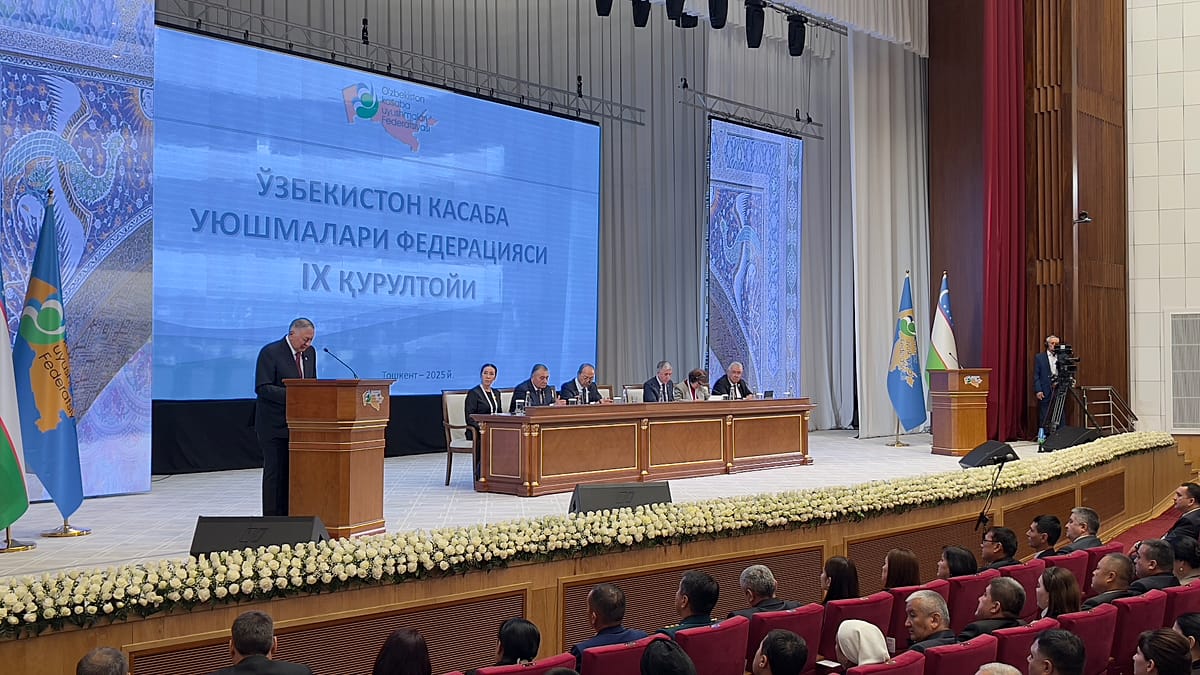As Uzbekistan marks the 120th anniversary of its trade union movement, attention has turned from commemoration to consolidation.
The country’s unions, once seen as ceremonial institutions, are increasingly becoming active players in shaping labour policy, supporting workplace reform, and helping balance the country’s rapid economic transformation with social stability.
At a congress of the Federation of Trade Unions of Uzbekistan (FTUU), delegates from across the country joined international observers to assess progress in strengthening worker rights and social dialogue.
All participants underlined that Uzbekistan’s labour landscape is experiencing a profound transformation, driven by a wave of legal and institutional reforms in which trade unions have taken an active role.
Central to this shift is the revised Labour Code of the Republic of Uzbekistan, initiated in 2019 and developed in collaboration with the International Labour Organization (ILO) and social partners such as the FTUU.
The new Labour Code introduced clearer frameworks for employment contracts, collective bargaining, and worker protection.
Among its most significant provisions are a legal requirement for equal pay between men and women, as well as strengthened labour inspection and monitoring systems to enhance enforcement capacity. The code also builds upon the ILO’s “Decent Work” agenda — pushing for safe working conditions, formal contracts, and social protection.
Trade unions as drivers of change
Uzbekistan’s trade unions have evolved from largely administrative entities into proactive agents of reform.
The FTUU has expanded its influence beyond traditional public-sector workplaces to include the private sector, seasonal agricultural labour, and informal employment. This expansion has supported the formalisation of labour relations among vulnerable groups.
Unions have become directly involved in monitoring safety standards in industries such as textiles and construction — both major employers and historically high-risk sectors.
They have also helped negotiate sectoral social agreements, contributed to minimum wage policy, and shaped occupational health reforms.
One concrete outcome emerged in the private textile cluster near Namangan, where union monitoring revealed gender-based pay disparities. Subsequent intervention and internal audits led to wage adjustments for over 400 women workers — a direct application of the Labour Code’s equal-pay principle.
Social dialogue at the core for reforms
Structured cooperation among government, employers, and workers has become a cornerstone of Uzbekistan’s labour reform agenda.
The National Council on Social Partnership of the Republic of Uzbekistan now serves as a platform to deliberate on minimum wage policy, vocational training, occupational safety, and collective bargaining.
According to ILO assessments, this tripartite mechanism now aligns more closely with international conventions. Both the FTUU and employers’ organisations have been strengthened to engage effectively within it.
For example, in 2023, the Council’s tripartite dialogue led to a 12% increase in the minimum wage for the cotton sector, effective from 1 January 2024, benefitting around 300,000 agricultural workers, according to the Ministry of Labour of Uzbekistan.
At the regional level, social dialogue continues to expand. “Our unions are committed to ensuring that every voice is heard — from large enterprises to small workshops,” says Nodira Voytinozarova, head of department at the FTUU. “Dialogue is the only way to prevent disputes before they escalate and to guarantee a sustainable and inclusive labour environment.”
Advancing the “Decent Work” agenda
Akiko Gono, President of the International Trade Union Confederation (ITUC), has commended Uzbekistan for aligning national labour policies with international standards.
“Over the past decade, Uzbekistan has made remarkable progress in aligning its labour policies with the principles of the International Labour Organization,” Gono stated. “Trade unions play an essential role in protecting the rights, health, and dignity of workers and their families, engaging in social dialogue, and contributing to the country’s sustainable development.”
Recent data underscores this progress. The World Bank notes that wage and salaried employment is rising, while the country has implemented “bold reforms” to strengthen social protection and create better jobs.
According to Okhundjon Isaev, Head of the Department for the Protection of Socio-Economic Interests of Workers at the FTUU: “During the last five years, significant results have been achieved. Social dialogue has continued to develop, alongside constructive cooperation between the government, employers’ organizations, and trade unions.”
Unions now help monitor labour contracts, support formalisation in agriculture and manufacturing, and play an active role in inspection and grievance mechanisms, particularly concerning occupational health and safety. Their advocacy also extends to women, persons with disabilities, and informal and seasonal workers.
Why it matters for investors and business
For businesses and investors, Uzbekistan’s evolving labour framework represents both progress and opportunity. A stronger labour-rights system, supported by trade-union oversight, reduces the risks of disputes, reputational harm, and compliance failures.
Greater formalisation of employment and improved inspection mechanisms also help companies meet international supply-chain standards, particularly in key export sectors like textiles and agribusiness.

